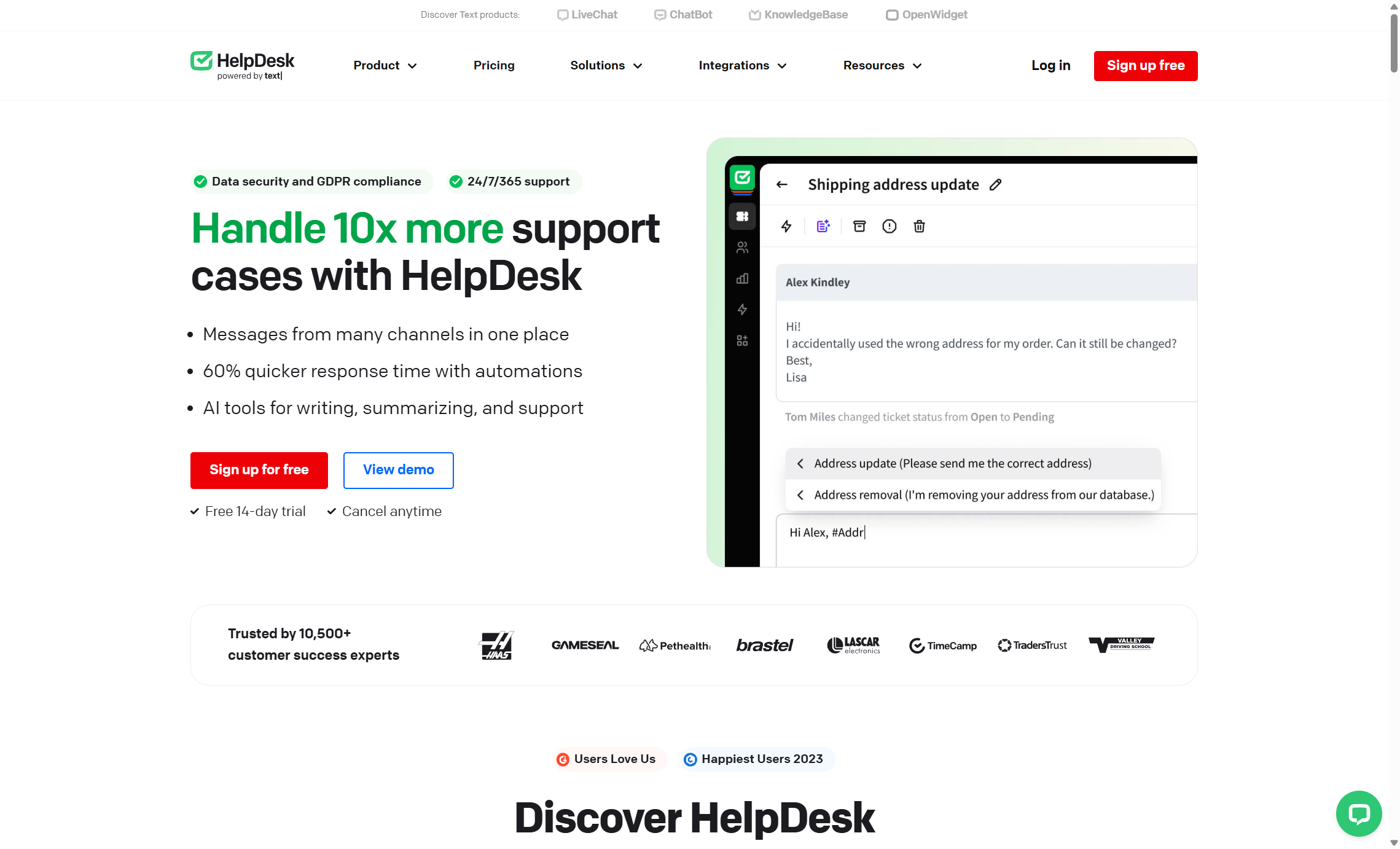TechRadar Verdict
HelpDesk.com provides a simple ticketing system. It has strong automation and supports multiple channels, which is great for businesses of all sizes. However, it may not have some advanced features or customization options. Larger companies or skilled support teams might need these features, which could limit scalability down the line.
Pros
- +
Easy-to-use intuitive interface
- +
Powerful automation features
- +
Multi-channel support integration
Cons
- -
Limited sorting and filtering options
- -
Occasional bugs in the web-app
- -
Sudden feature changes/removals
Why you can trust TechRadar
HelpDesk is a customer support platform that centralizes inquiries, technical issues, and service requests. This cloud-based help desk system acts as a single contact point between users and support teams. It streamlines communication and enhances the customer experience. With AI, machine learning, and automation, HelpDesk offers a flexible solution accessible via email, chat, and web portals.
HelpDesk organizes and optimizes customer service workflows with strong ticket management features. Support teams can track, prioritize, and resolve cases efficiently. Features like collision detection prevent duplicate work. Customizable views help focus ticket management, while automated archiving keeps the dashboard clean.
HelpDesk also automates repetitive tasks and offers AI tools for ticket summarization and tone adjustment. Team collaboration is easy with private notes and organization features. Together, these tools reduce manual workload, cut ticket resolution time, and boost agent productivity.
HelpDesk benefits various businesses across industries, from small firms to mature enterprises in B2B, marketing, and fintech. Its analytics and reporting features provide insights into team performance, customer satisfaction, and operational trends — which have cross-industry uses. But, the occassional bugs and filtering limitations might be a problem for large-scale organizations.
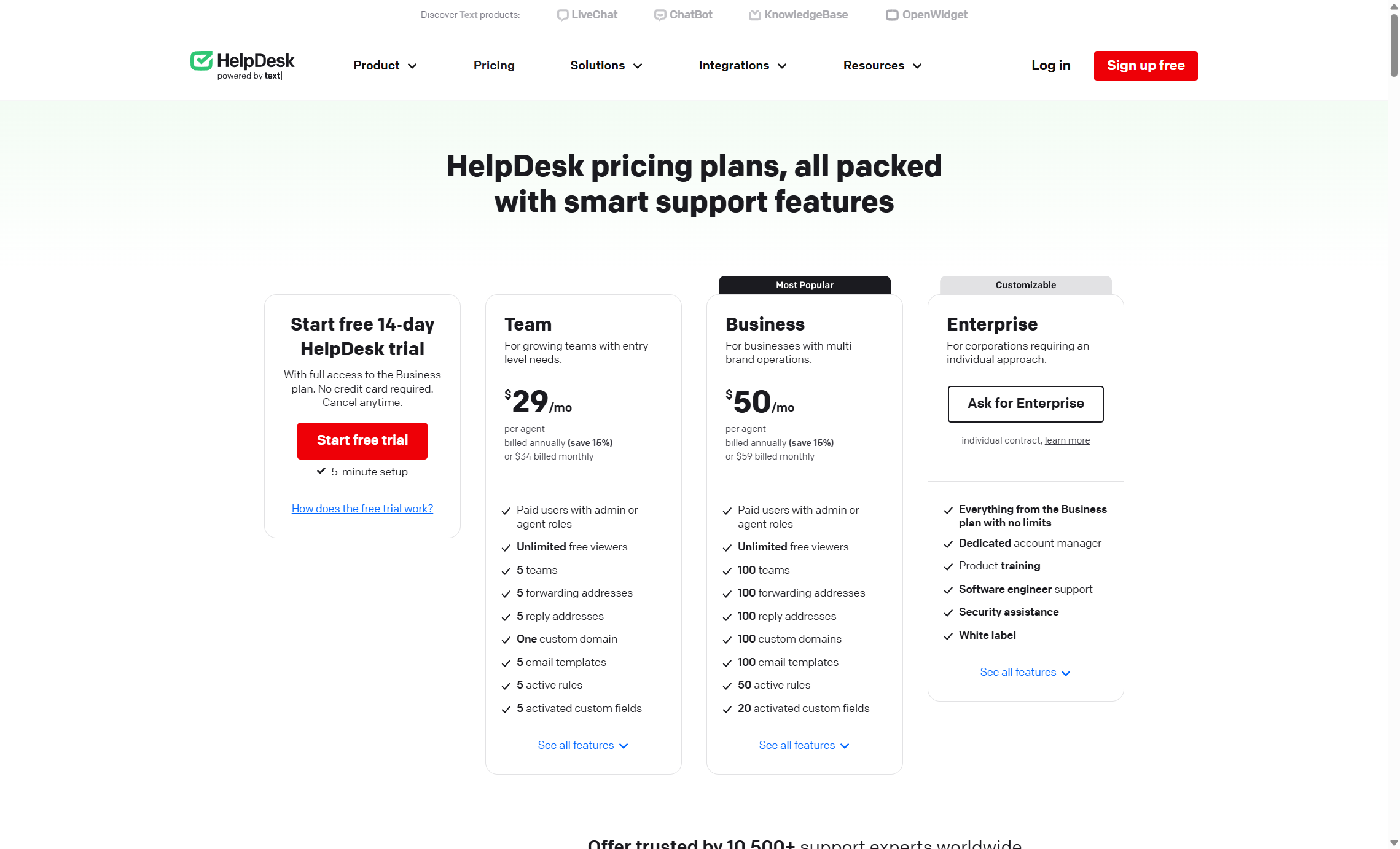
HelpDesk: Plans and pricing
HelpDesk has a flexible pricing structure with three plans for different business needs. The Team plan is for growing companies and costs $29 per agent per month with annual billing. If billed monthly, it’s $34 per agent. This plan features multiple inboxes, so teams can manage various email addresses in one place.
The Business plan is for organizations with multi-brand operations. It costs $50 per agent per month when billed annually and $59 per agent when billed monthly. For larger companies needing custom solutions, HelpDesk offers an Enterprise plan with tailored contracts and pricing.
Each pricing tier includes increasing customer service features. This makes it easy for businesses to find the right fit. But all plans support team collaboration by centralizing customer tickets. Agents can set up automation rules for repetitive tasks, while managers get detailed reports to improve performance.
Sign up to the TechRadar Pro newsletter to get all the top news, opinion, features and guidance your business needs to succeed!
HelpDesk gives a risk-free 14-day trial of the Business plan, with no credit card needed. You can cancel anytime. This trial allows full access to Business plan features, letting customers evaluate the platform before deciding. After the trial, you can choose any of the three plans based on your needs. HelpDesk also offers a 15% discount for annual payments.
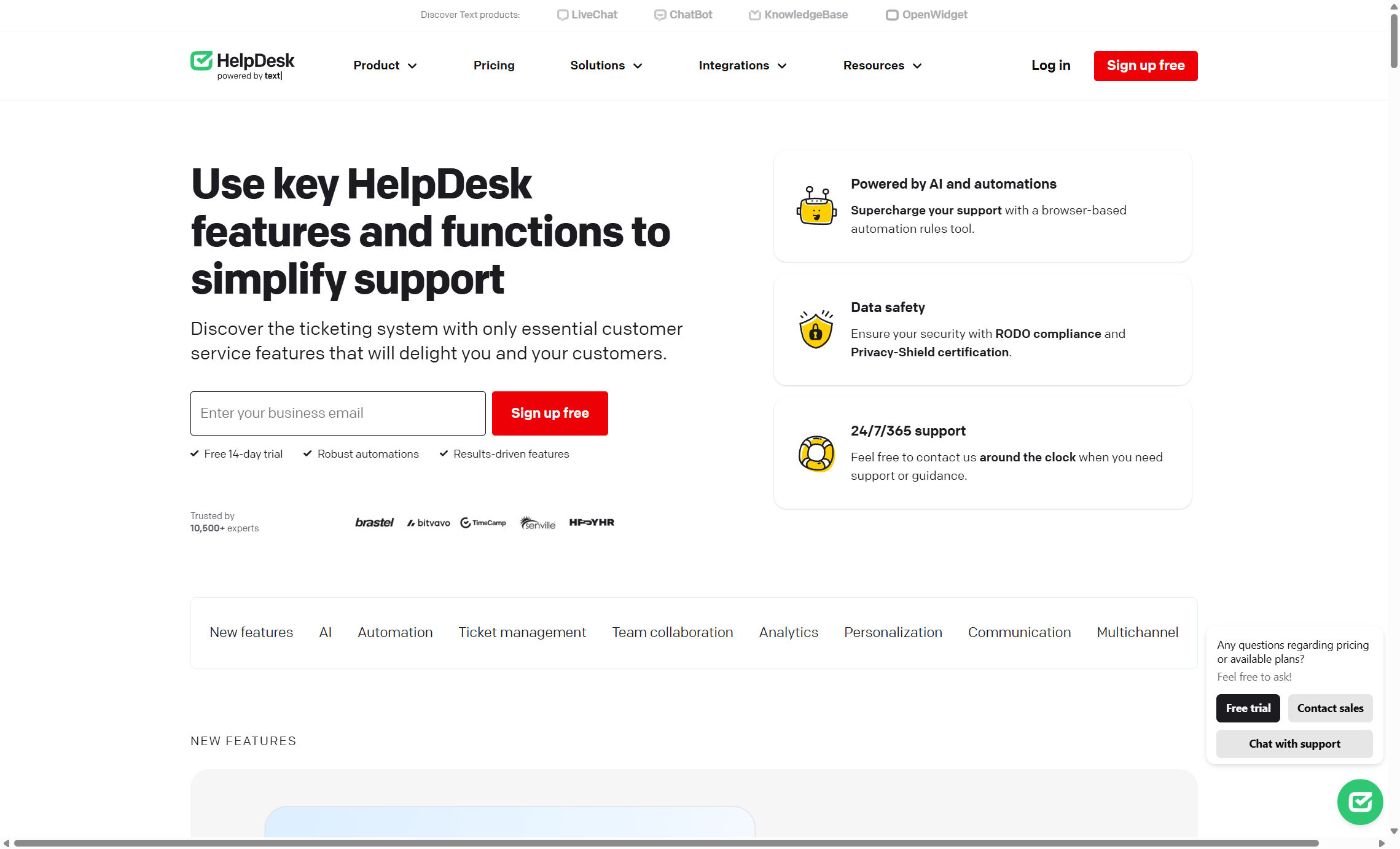
HelpDesk: Features
HelpDesk.com provides a wide range of features to improve customer support and service quality. Its tools support businesses of all sizes, from small startups to large companies. Primarily, HelpDesk offers ticket management, automation, collaboration, and more.
A strong ticketing system, advanced automation, multi-channel support, and detailed reporting tools work together to solve common issues in customer service. The platform is very flexible, allowing businesses to customize it to meet situational needs.
Intuitive ticketing
HelpDesk's ticketing system is the main hub for managing customer inquiries and support requests. It allows for easy tracking, prioritizing, and resolving of customer issues. This ensures that no query is overlooked.
With features like collision detection, agents can see if a teammate is already handling a ticket. The system also supports customizable views. Support teams can filter and organize tickets by priority, status, or other criteria. This helps you manage many tickets efficiently, leading to faster resolutions and happier customers.
Self-service options
HelpDesk offers a strong Knowledge Base and Self-Service Portal. These tools help customers find solutions independently, reducing the workload on support teams. Businesses can create, organize, and maintain a central repository of information, including FAQs, troubleshooting guides, and best practices.
The Knowledge Base is designed for both customers and support agents. Customers have a searchable interface to quickly access information 24/7, without contacting support. Meanwhile, support agents can track behind-the-scenes performance data to see how effective the self-service options are.
Automation tools
HelpDesk's automation features eliminate many repetitive tasks and improve workflow efficiency. You can create custom rules to manage routine processes like ticket routing, status updates, and follow-ups.
By using these automation tools, you can reduce a ton of manual work. This allows youragents to focus on complex issues that need human attention. According to a case study, the Brastel team managed nearly 2,000 tickets per month using HelpDesk's automation. This led to a 39% decrease in ticket resolution time and saved about 12 minutes per ticket.
Multi-channel support
HelpDesk ensures smooth communication across various channels, including email, web forms, and social media. Its multi-channel approach lets customers reach out however they prefer, while support teams manage all interactions from one platform.
Centralizing communications helps businesses maintain consistent support quality across channels. It also gives support teams a full view of each customer’s interaction history, no matter the channel. This leads to more personalized and informed responses, improving customer satisfaction and strengthening client relationships.
Collaborative features
HelpDesk provides strong collaboration tools that enhance teamwork and knowledge sharing among support agents. Features like private notes, team assignments, and shared views make it easy to work together on complex issues.
These tools ultimately create a more efficient support environment. Agents can consult with colleagues, share expertise, and tackle challenging cases together. By encouraging teamwork and knowledge sharing, businesses can improve overall support quality, reduce resolution times, and enhance their support team's skills.
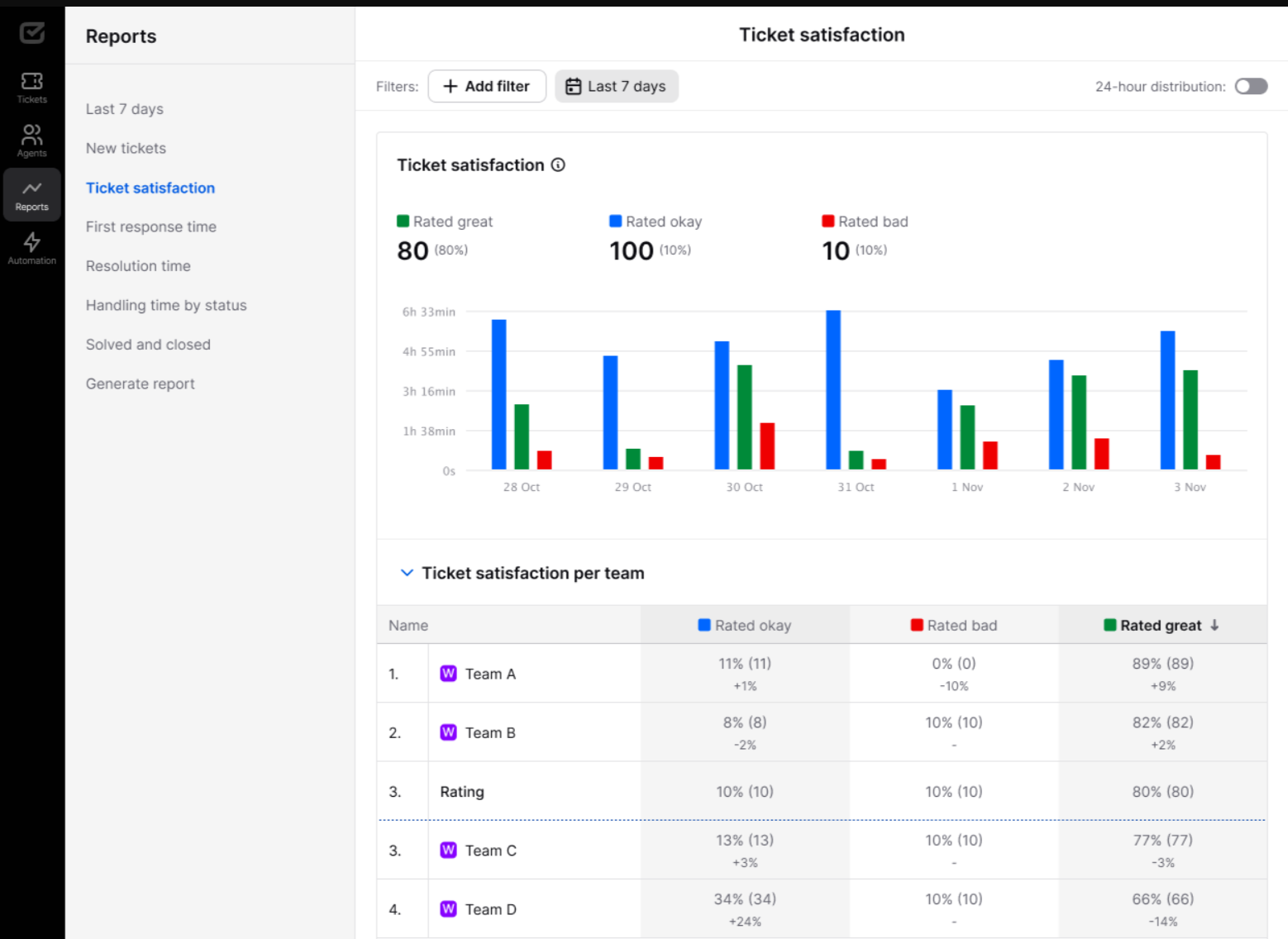
HelpDesk: Analytics
HelpDesk provides a full suite of reporting and analytics tools. These tools give clear insights into customer support performance. The "Reports" section gives teams a detailed look at key metrics. This helps them monitor and improve their support operations.
As of 2025, HelpDesk offers five main report types: Last 7 days, New tickets, Ticket satisfaction, First response time, and Resolution time. These reports help support managers track key KPIs and make smart decisions to boost customer service quality.
HelpDesk makes it easy to compare performance across support groups. It also helps identify top performers and areas needing improvement. The platform even shows daily data for each report type, allowing for trend analysis and ongoing performance tracking. For tickets that are unassigned or linked to deleted agents or teams, HelpDesk marks these as "N/A." This ensures data accuracy and transparency.
The "Last 7 days" report gives a valuable snapshot of ticket activity. It shows the total number of tickets received, solved or closed, average response times, and customer satisfaction ratings. This helps support teams stay on top of their performance and spot immediate issues. By tracking these metrics, support managers can set benchmarks, establish goals, and monitor their progress toward better customer satisfaction and efficiency.
HelpDesk's reporting features allow managers to access detailed analytics for ongoing team improvement. The platform’s data-driven approach helps businesses find bottlenecks, improve workflows, and enhance customer experience. By using these insights, support teams can make informed choices about staffing, training, and process improvements. This ultimately leads to more efficient operations and higher customer satisfaction.
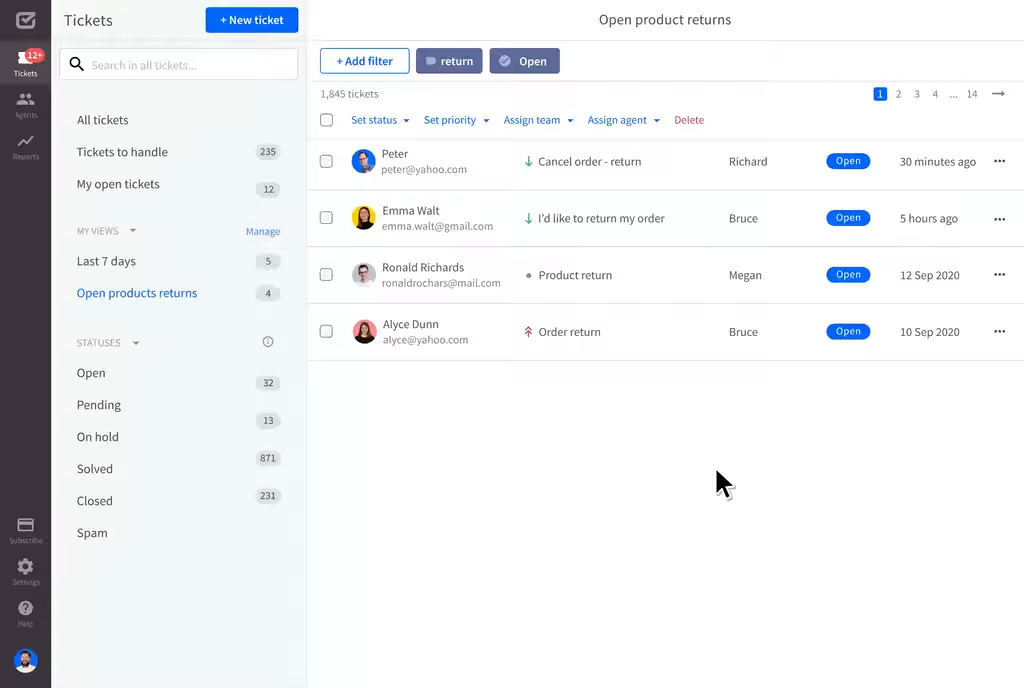
HelpDesk: Ease of use
One of the biggest draws of HelpDesk is that it's cloud-based, so should run effectively on any machine that has a web browser. This could be very helpful if your organizations has a BYOD (Bring your Own Device) policy or if any of your agents work from home as the software is truly cross-platform.
HelpDesk also supports a 'free view' mode whereby you can display your ticketing system to viewers via a web browser without them changing anything.
Customer experiences of the UI itself are more mixed. From online reviews we've read, there are those who find it clunky as well as those who find it quite intuitive. HelpDesk is keen to show how seamless it can be to automate tasks via a short online video demo, but this doesn't cover more advanced topics like handling dashboard analytics. We suggest availing of the 14-day free trial to see if the interface works well for you.
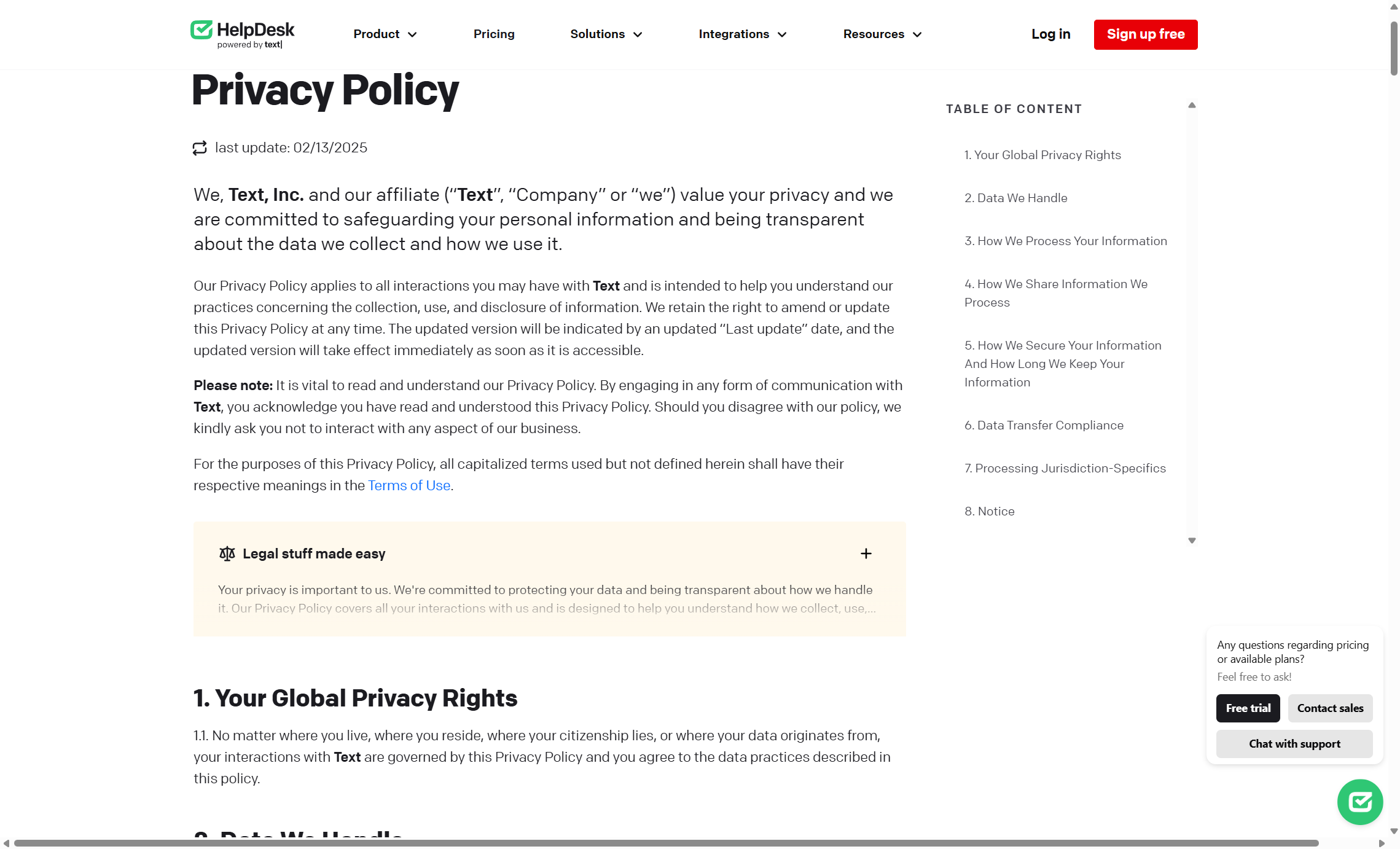
HelpDesk: Security
HelpDesk has a dedicated Security page, where they confirm their data centers are provided by IBM Cloud, located both in Texas, US and Frankfurt, Germany. The company claims there's always a security guard on duty at these locations. The company also purports to be SSAE 16-compliant, which in theory means its internal data security standards have been audited and approved by a third party.
HelpDesk's parent company LiveChat uses the Transport Layer Security (TLS) protocols: 1.2 and 1.3. They state that when accessing their software, you are communicating with LiveChat through Akamai, their Content Delivery Network provider. During this communication, you negotiate through which encryption algorithm will be used before the application protocol transmits or receives its first bytes of data.
They also point out that most LiveChat connections are encrypted with the TLS 1.2 protocol. Naturally, as HelpDesk is web-based the encryption protocol used will depend on the browser used by agents to access the platform.
Still, this shouldn't be an issue provided all agents use a secure web browser and keep it up to date.
When it comes to data at rest, HelpDesk claims to secure all information and is therefore GDPR compliant. We would have appreciated more information here about how data is encrypted, such as through 256-bit AES encryption.
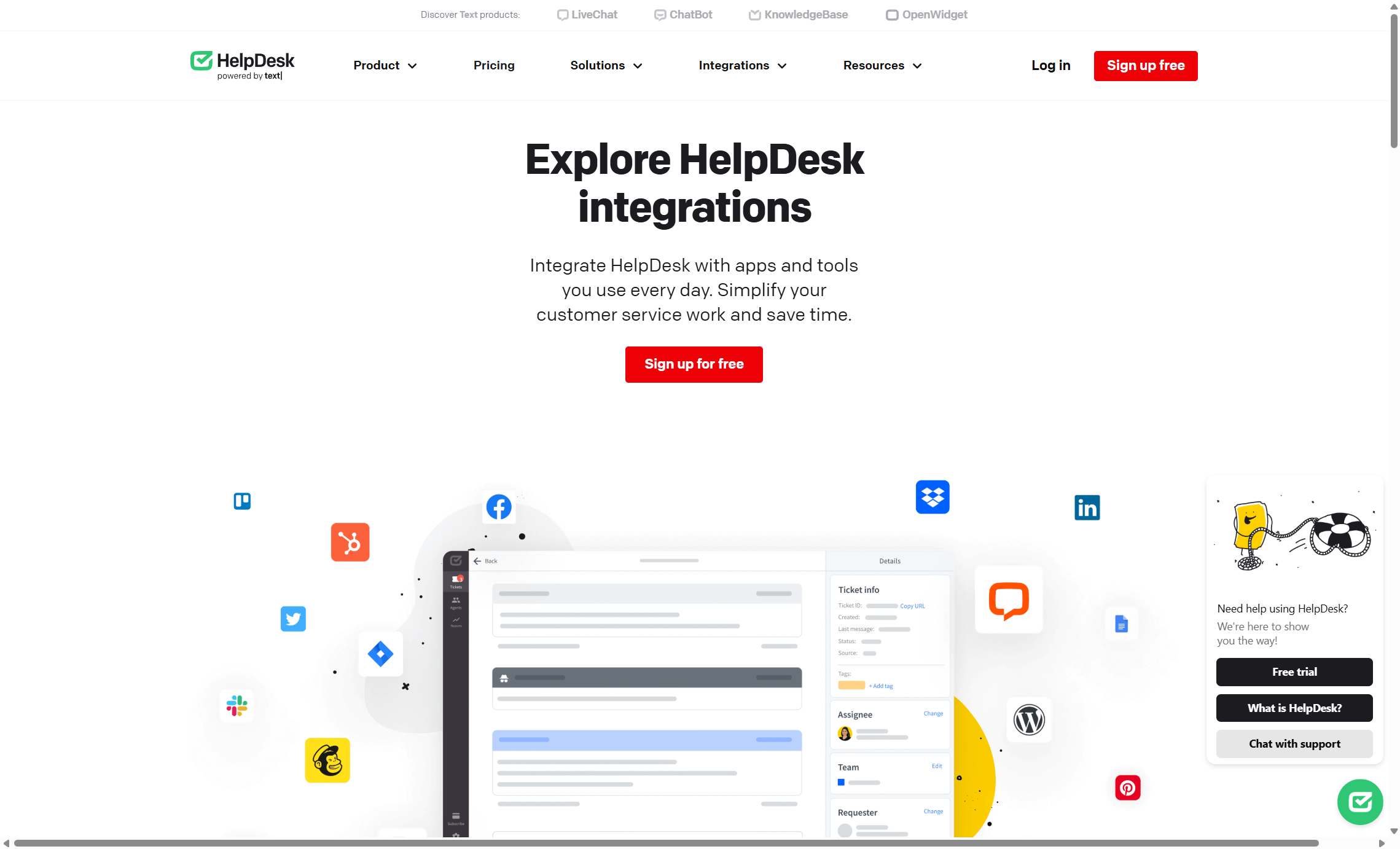
HelpDesk: Integrations
As with many other help desk and live chat software solutions, the integrations offered by HelpDesk are one of its defining features. These help the platform seamlessly connect with many other popular business tools, which can take your team's productivity to new heights.
Some of the apps that are designed to integrate with HelpDesk, include communication platform Slack and Salesforce, with the latter being well-known to many organizations as one of the best CRM programs on the market today. With Salesforce for HelpDesk, you can create, view, and automate your Salesforce workflows directly in the HelpDesk platform. You can also integrate with GitHub, HubSpot, and WordPress.
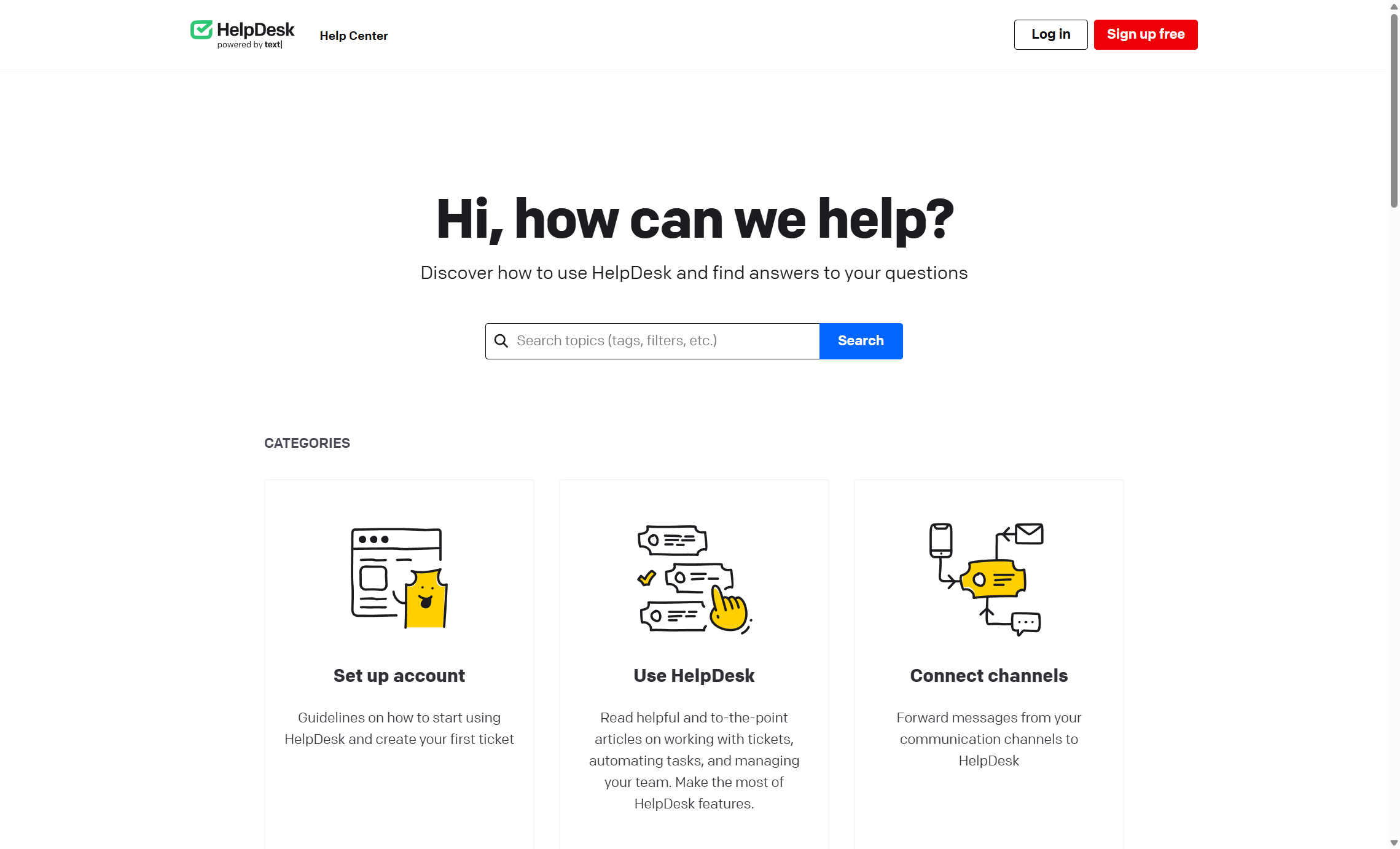
HelpDesk: Support
Both pricing tiers of HelpDesk include 24/7 support by e-mail chat and phone, though if you want a dedicated trainer to help you with the platform you'll need to sign up for the 'Enterprise' plan.
Beyond this, the main website has an extensive resources section including the extremely useful "HelpDesk Handbook" for beginners to the platform. It includes a basic introduction to HelpDesk along with some tips and tricks. The handbook is broken down into different sections, from setting up your account, managing workflows, enhancing task management, and performance reporting.
The Help Center is also an excellent resource, with clear guides on common topics like setting up your account and integrating apps. Again, this is broken down by common categories, so finding exactly what you need shouldn't be a problem.
HelpDesk: The Competition
The help desk, ticketing, and live chat markets have become increasingly competitive of late - and this is, partly at least, due to the emergence of more AI tools. AI has already become a core component for many support programs, allowing employees to focus on adding value for customers rather than focusing on carrying out repetitive, manual tasks.
For instance, Intercom, Tidio, and LiveChat represent just a few of HelpDesk's competitors and each is keen to push its AI credentials. As a case in point, Intercom makes much of its Fin AI feature, which is able to automatically summarize conversations in your inbox, personalize replies, and autofill ticket information
Not to be outdone by its rivals, HelpDesk offers AI-empowered ticketing and boasts that it has been responsible for over 23 million custom automation so far. For example, you can access an AI ticket summary and use AI to help compose your messages and customize your tone of voice.
HelpDesk: Final verdict
There's a lot to love about HelpDesk. The pricing tiers are straightforward (though we would have liked to see a rough quote for the 'Enterprise' plan on the website). The website also has gone to great lengths to give users an overview of the platform and the features are everything we'd expect to see from a ticketing system.
Although subs are a little pricy, for your money, you do get dedicated 24/7 support by phone, chat or e-mail. The interface also seems to be very simple to master.
We've rated the best ITSM tools.
Nate Drake is a tech journalist specializing in cybersecurity and retro tech. He broke out from his cubicle at Apple 6 years ago and now spends his days sipping Earl Grey tea & writing elegant copy.
You must confirm your public display name before commenting
Please logout and then login again, you will then be prompted to enter your display name.
